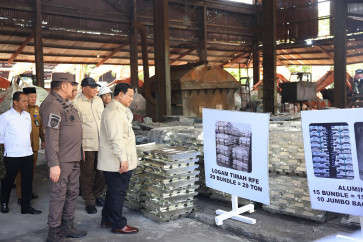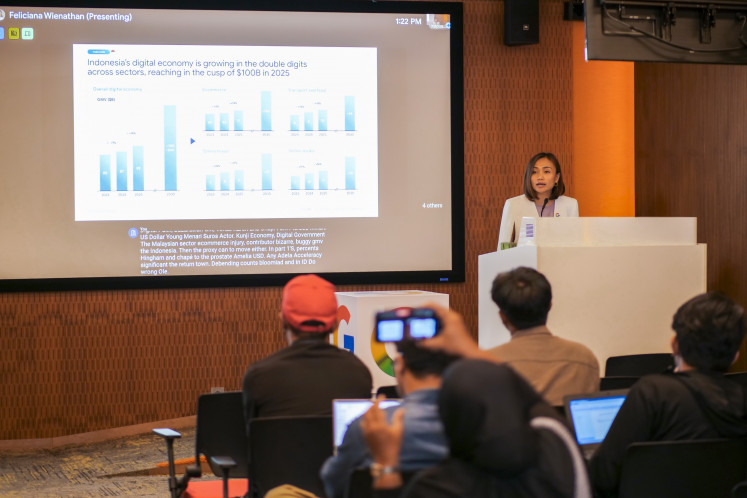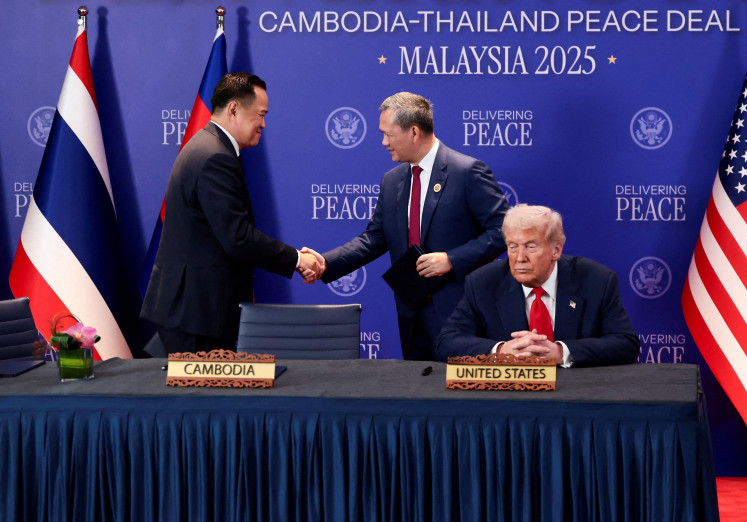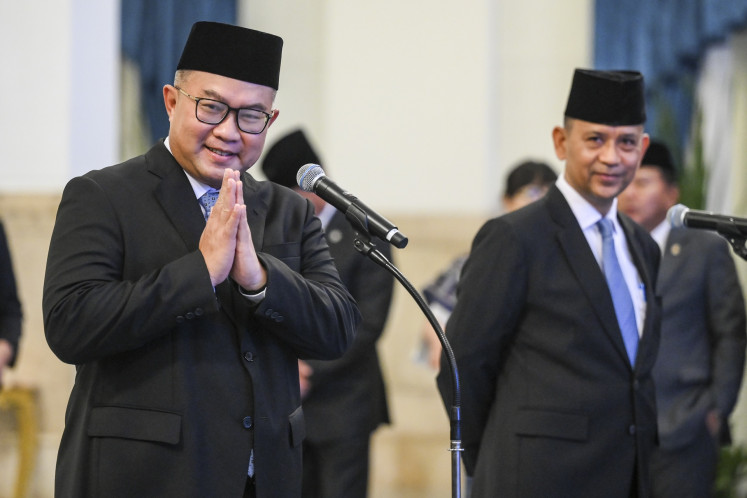Popular Reads
Top Results
Can't find what you're looking for?
View all search resultsPopular Reads
Top Results
Can't find what you're looking for?
View all search resultsInaccurate and misleading reports on HTI
Frankly, this is not the first time The Jakarta Post has published misinformation regarding Hizbut Tahrir Indonesia (HTI)
Change text size
Gift Premium Articles
to Anyone
F
rankly, this is not the first time The Jakarta Post has published misinformation regarding Hizbut Tahrir Indonesia (HTI). A number of news reports have been clearly inaccurate and misleading. Such reports do not do justice to local or international readers in providing the balanced points of view they deserve to make up their own minds about HTI.
For instance, on Feb. 2, 2010 the Post reported that the National Alliance for the Freedom of Religion and Faith (AKKBB) sought a judicial review of the blasphemy law (Law No. 1/PNPS/1965) by the Constitutional Court. The Post wrote “Militant groups ready to defend controversial law”. The article went on to say:
“The Islamic Defenders Front (FPI) and Hizbut Tahrir Indonesia (HTI) said they would defend the controversial blasphemy law, calling the move to scrap the 45-year-old law an attempt to ‘liberalize’ and destroy Islam. The two radical groups have met with Religious Affairs Minister Suryadharma Ali to lend their support to the government to fight against the plan of human rights groups to have the law reviewed by the Constitutional Court.”
The use of the “militant groups” or “radical groups” carries negative connotations as if HTI belongs to a group that does not believe in dialogue and commits violence to propagate its messages. Moreover, it is unfair to single out HTI, because the two largest Muslim organizations — Nahdhatul Ulama (NU) and Muhammadiyyah — have both expressed support for the 1965 law also.
In addition to condoning the use of unfair labeling, the Post also published wrong information about a meeting between the religious affairs minister and HTI. The Post quoted a statement by AKKBB lawyer Uli Parulian without verification from an HTI source. On Feb. 4, the Post cited Uli Parulian Sihombing who “...deplored the meeting between the religious minister and the militant groups. ‘A minister should not conduct such a meeting. The worst thing is, we are also informed that the meeting used state funds,’ he told the Post.” We stress the fact that HTI never attended the said meeting, though HTI fully supports the cause for defending the 1965 law.
Even worse, the Post also reported that HTI members attacked AKKBB during the 2008 demonstration supporting Ahmadiyah at the National Monument (Monas) square. This is incorrect. HTI was never involved directly or indirectly in this incident. HTI is an Islamic group that seeks the implementation of sharia via the reinstatement of the Caliphate, purely by intellectual and political means, without resorting to any acts of violence.
The most recent opinion piece by Tobias Basuki published by the Post on Feb. 11 also referred to a meeting between the religious affairs minister with HTI and FPI on Feb. 4, 2010. Again, HTI did not even attend the meeting and FPI was not the only group which met with the minister.
Tobias has also ignored another fact: that tremendous support for the 1965 Law has come from a number of religious groups. Instead, Tobias labeled “groups with loud voices” whom he collectively called the “radical mob”, which is clearly uncalled for.
Oxford dictionary describes a mob being “a disorderly crowd of people”. Using Tobias logic, supporters of the law are simply a “radical and militant mob”, which includes grassroots religious organizations, like NU and Muhammadiyah.
Curiously, Tobias wrote, “The FPI, and particularly the HTI, should not have a say on matters of the Indonesian people. The HTI does not represent the interests of the Indonesian people and our nation.” First of all, Tobias has no right to judge HTI and FPI as having no say in matters of the Indonesian people. All Indonesian citizens have the right to get involved and strive for the betterment of Indonesia itself.
Moreover, being the largest Muslim country, Indonesia has significant numbers of FPI and HTI members spread throughout its 33 provinces and in more than 300 cities. So who can deny the rights of FPI and HTI who are obviously Indonesian citizens? How could one conclude that HTI and its members have no concern for the affairs of the Indonesian people?
Second, notwithstanding having very easy access to verification, Tobias seems to conveniently ignore various HTI activities. HTI is clearly concerned with the current condition of the people and their nation that has been struggling with poverty, corruption, moral decadence, injustice, exploitation and ignorance. From HTI’s point of view, the source of the problem is untrustworthy leadership running a bankrupt secular system.
Therefore, HTI offers a justifiable, testable and conceptual solution, i.e. Islamic sharia. Rallying on a singular theme “Save Indonesia with Sharia”, HTI has organized various activities to remind the people that the Islamic solution emanating from the Most Benevolent and Merciful is the only answer for humanity. This system or Islamic sharia will liberate the people from the shackles of secular capitalism and corrupt and exploitative rulers.
As for HTI, the efforts to liberate the people from poverty, ignorance, decadence, crime and national disintegration are religious duties. HTI moves, works and breathes with the people in criticizing and speaking out against unjust policies such as energy price increases, privatization of state companies, dependency on foreign debt, commercialization of education and public health that add burdens to our current misery.
HTI also offers the practical solution of Islamic sharia, which states that the state must provide the basic needs of individual citizens such as food, clothing and housing in addition to free education and accessible health services.
HTI asserts that natural resources belong to the people and must be administered by the state with full responsibility and accountability instead of being contracted out to foreign companies.
Moreover, HTI has also exposed dangerous moves in Papua, Aceh and Ambon, which potentially lead to national disintegration.
Even more importantly, HTI is deeply concerned with the purity of the Islamic creed adopted by the majority of Indonesian citizens. Moreover, the harmony among different religious communities must also be protected. In this context, HTI has participated in the defense of the 1965 law that is currently under judicial review.
The abolition of the law will lead to the mushrooming of various sects that can blaspheme or smear existing Islamic creed, or any other religious creeds for that matter. Without a law to protect religious creed, social conflicts will very likely occur unimpeded.
The 1965 law does not encroach on the right to embrace any religion. Islam itself never forces anyone to convert. According to Islamic sharia, every religious adherent is free to perform their own rites. However, the freedom of ritual expression does not constitute the freedom to blaspheme against other religions. This is why the 1965 law is needed to avoid blasphemous acts that may ignite great social discords.
HTI does not view the law as a cause of violence. Au contraire, the failure to enforce the 1965 law has pushed some members of society to take matters into their own hands. Social unrest occurs because of a lack of action by the state to prosecute blatant offenses perpetrated by certain individuals and/or deviant sects that have attacked or ridiculed well known Islamic tenets.
Are there any rational persons who are ready to face the resulting instability as a consequence of abolishing the law and bear the responsibility simultaneously? Seeking to abolish the 1965 law is tantamount to wishing for social conflicts.
HTI has carefully deliberated these aforementioned points and decided to join effort to prevent the abolition of the 1965 law as sought by a handful of groups. One may then question the legal standing of AKKBB among others who seek the abolition of the 1965 law. They are neither religious groups nor promoting a religious agenda. So who says HTI has no say in this matter?
Clearly HTI and the Post may each endorse different and perhaps opposing opinions up to this very day.
Muhammad Ismail Yusanto is a spokesman for Hizbut Tahrir Indonesia (HTI).










